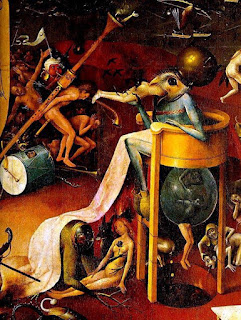
I have previously touched on the topic of hell. That the present aversion to any “real” hell in the next life and subsequent reinterpretation or outright dismissal is a cultural phenomenon I have already eluded to. Recently I read the blog of a Christian pastor in which he defended the view that hell is simply the self-centeredness of egotistical people, of their wallowing in raging passions and self-pity. Quoting Tim Keller he says: “Hell then is the trajectory of a soul living a self absorbed self centered life, going on and on forever.” The “fire” of hell refers to “refinement” or “purification,” while in another place burning with fire simply means never being complete, i.e. continually being broken down or destroyed, something that takes place right here without reference to a here-after.
This isn’t the first time in the history of the Church that hell has been viewed in a metaphorical sense. St. Ambrose, St. Jerome, and Origen (to name a few) understood “fire” to refer to God’s wrath. “Eternal” has been understood as “definitive” or “final” rather than referring to duration per se. So our pastor is in fine company. Of course, after 553 and the Second Council of Constantinople and later the Fourth Lateran Council in 1215, hell officially took on its more traditional form and was affirmed as an eternal (in the sense of duration) punishment: “If anyone says or thinks that the punishment of demons and of impious men is only temporary, and will one day have an end, and that a restoration will take place of demons and of impious men, let him be anathema” (2nd Council Const. This against good Origen).
What of the form of hell? Our good pastor was partly correct in pointing out the influence of Dante’s work on the European imagination. It was he who once wrote: Lasciate ogni speranza, voi ch’entrate (Abandon hope all you who enter here). But our pastor friend neglected to mention another text of great importance, the very one Dante himself relied on: the second century Apocalypse of Peter (not to be confused with the much more pleasant Gnostic version). If you’re looking to have the crap scared out of you or to be made ill this makes for an excellent read.
But where did all this arise? Even a brief look at the Hebrew scriptures (OT) will confirm the complete lack of any semblance to the Christian understanding found in the NT scriptures, even on the very lips of Jesus himself. This is where I think we must part ways with our pastor who says very little about Jesus and hell. One must never forget that Jesus was a man of his times, informed by the same apocalyptic writings that many of his contemporaries were. Of course, our pastor would assume that Jesus was “in the know” about these things and had no need to rely on such writings. Within the circular argument of faith it is almost impossible to convince people otherwise, but I might point out that Luke says even Jesus “grew in wisdom and in stature” (2:52), that he was found “sitting among the teachers, listening to them and asking them questions” (2:46), i.e. he learned and was taught (even if, perhaps, he learned at an accelerated rate).
It is not enough to stop at the Councils or at our present cultural interpretation of hell (which is all too accommodating in any case). It is obvious too that it is not sufficient to stop at the canonical writings as there we are faced with a huge gap. We shall have to revisit this.
No comments:
Post a Comment